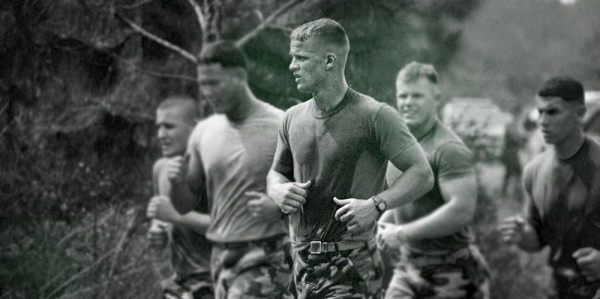

Editor’s note: This article was originally published on Nov. 10, 2016.
On April 14, 2004, Marine Cpl. Jason Dunham, a squad leader with 3rd Battalion, 7th Marines, was leading his men on a mission near Karabilah, Iraq. A call came through that the battalion commander’s convoy was under attack by small-arms fire and rocket-propelled grenades. Hopping into Humvees, the Marines made their way toward Camp Husaybah, two kilometers away.
When they arrived, the Marines split into two teams to search for the shooters. When Dunham and his men came to an intersection and saw a line of cars along a dirt alleyway, they began searching the vehicles for weapons. As Dunham approached a rundown white Toyota Land Cruiser, the driver, wearing a black tracksuit, leapt from the vehicle and the two tumbled to the ground.

As they struggled, two Marines, Pfc. Kelly Miller, and Lance Cpl. William B. Hampton, rushed forward to help. According to The Wall Street Journal, Dunham was heard yelling “No, no, no — watch his hand!” as a grenade rolled to the ground. The pin had been pulled and the spoon was gone. The grenade was live.
Without hesitation, Dunham leapt on top of it. Covering the grenade with his Kevlar helmet and body, he absorbed the full impact of the blast.
Dunham survived the initial explosion, but succumbed to his wounds on April 22, 2004. His selfless sacrifice saved the lives of at least two other Marines, at the cost of his own. He was 22.
Just weeks earlier, The Wall Street Journal reported, Dunham and his fellow Marines speculated on how to survive a grenade attack, with Dunham suggesting what would later be his last heroic act.

Standing just over six feet tall, Dunham was a lifelong athlete who enlisted in the Marines in 2000. He was known for leading from the front, and admired by those below and above him. Set to complete his enlistment in July of that year, Dunham extended his contract by several months in order to stay with his Marines and ensure they made it home.

On Jan. 11, 2007, then-President George W. Bush presented Dunham’s family with the Medal of Honor, the nation’s highest award for valor, during a ceremony at The White House.
“He was the guy who signed on for an extra two months in Iraq so he could stay with his squad,” said President Bush during the ceremony. “As he explained it, he wanted to make sure that everyone makes it home alive. Cpl. Dunham took that promise seriously and would give his own life to make it good.”

Marines who stepped onto the yellow footprints years later learned of Dunham’s actions in boot camp and during the Crucible, where his citation is read to those seeking to earn the title Marine. On March 20, 2007, the Navy christened a new Arleigh Burke-class destroyer the USS Jason Dunham, and numerous buildings, training courses, and rooms across the Corps bear his name.
This year, Nov. 10 marks the Marine Corps’ 241st birthday. If he was alive, Dunham would be turning 35 that same day.
“In the end, Cpl. Dunham, you proved that one man can make a difference,” said his former company commander, Maj. Trent Gibson. “You proved to be utterly selfless, uniquely compassionate, and absolutely committed to your men … You were that which we all strived to be. And you were somehow more pure.”
